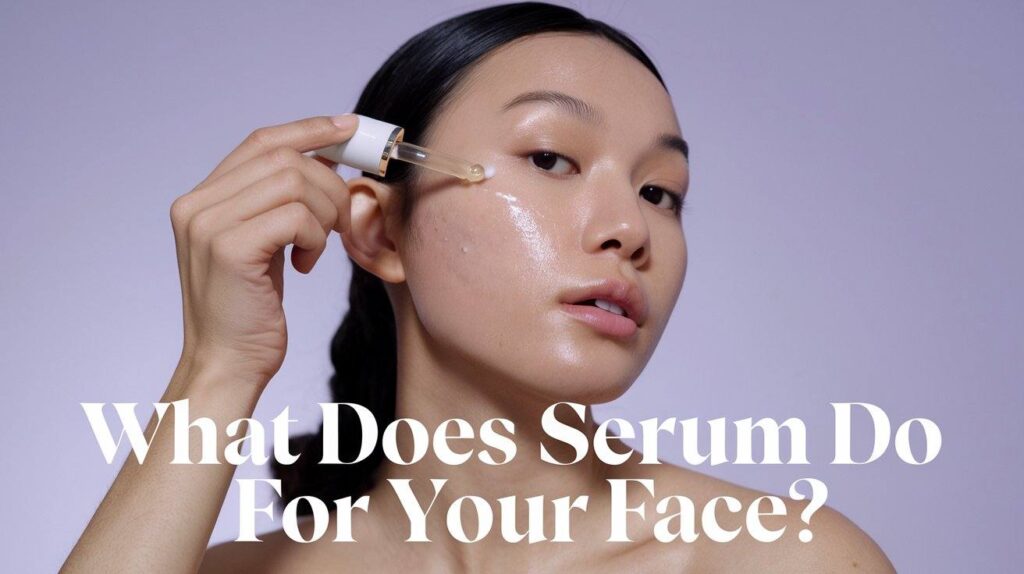In the world of skincare, serums have taken center stage, but what does serum do for your face? If you’ve ever wondered why beauty experts rave about serums, you’re not alone. Serums are lightweight, fast-absorbing formulas packed with high concentrations of active ingredients that target specific skin concerns. Whether you struggle with dryness, acne, wrinkles, or uneven skin tone, the right serum can transform your skin.
In this article, we’ll explore the seven proven benefits of using facial serums and how they can elevate your skincare routine. If you want a radiant, youthful complexion, keep reading to learn why serums are a must-have in your beauty arsenal!
What Does Serum Do for Your Face?
The Science Behind Face Serums and Their Impact on Skin
Face serums are formulated with concentrated active ingredients that penetrate deeply into the skin, delivering targeted benefits.
These lightweight formulations are designed to address specific skin concerns, such as hydration, aging, and brightening. But what does serum do for your face? Scientifically, serums utilize smaller molecules that allow for deeper absorption, making them more effective than traditional moisturizers.
They help strengthen the skin barrier, improve elasticity, and enhance overall skin health. By incorporating a serum into your skincare routine, you can experience noticeable improvements in texture, hydration, and radiance.
What Does Serum Do for Your Face? The Key Benefits Explained

1. Deep Hydration for Plump Skin
One of the biggest benefits of using a facial serum is its ability to deeply hydrate your skin. Unlike moisturizers, which sit on the skin’s surface, serums penetrate deep into the layers of your skin, delivering hydration where it’s needed most.
Key Hydrating Ingredients in Serums:
- Hyaluronic Acid – Holds up to 1,000 times its weight in water, keeping skin plump and hydrated.
- Glycerin – Attracts moisture from the air to your skin, preventing dryness.
- Aloe Vera Extract – Soothes and hydrates for a refreshing glow.
If you have dry or dehydrated skin, incorporating a hydrating serum into your routine can improve moisture levels and prevent dullness.
2. Reduces Fine Lines and Wrinkles
Wondering what does serum do for your face when it comes to aging? Serums are packed with powerful anti-aging ingredients that help reduce fine lines and wrinkles over time.
Best Anti-Aging Ingredients in Serums:
- Retinol – Speeds up cell turnover and stimulates collagen production.
- Vitamin C – Brightens skin and reduces signs of aging caused by free radicals.
- Peptides – Support skin repair and maintain elasticity.
By using an anti-aging serum consistently, you can achieve smoother, firmer skin with a youthful glow.
3. Brightens and Evens Skin Tone
If you struggle with dull skin, dark spots, or hyperpigmentation, serums can work wonders in restoring a radiant complexion.
Brightening Ingredients to Look for:
- Vitamin C – Fades dark spots and improves overall skin tone.
- Niacinamide (Vitamin B3) – Reduces redness and uneven pigmentation.
- Licorice Extract – Naturally brightens the skin and reduces discoloration.
Using a brightening serum daily can help achieve a glowing, even complexion over time.
4. Fights Acne and Breakouts
Acne-prone skin can benefit greatly from targeted serums that help control breakouts and reduce inflammation.
Best Ingredients for Acne-Prone Skin:
- Salicylic Acid – Unclogs pores and prevents acne breakouts.
- Tea Tree Oil – Has antibacterial properties that combat acne-causing bacteria.
- Zinc – Helps control oil production and reduce inflammation.
A good serum can clear up your skin without over-drying it, leading to a balanced, healthy complexion.
5. Strengthens the Skin Barrier
Your skin barrier is essential in protecting against environmental stressors like pollution and UV rays. A strong barrier keeps moisture in and irritants out.
Ingredients That Strengthen the Skin Barrier:
- Ceramides – Restore the skin’s protective layer.
- Panthenol (Vitamin B5) – Reduces sensitivity and promotes healing.
- Centella Asiatica – Soothes and strengthens the skin barrier.
By using a serum with these ingredients, you can improve your skin’s resilience and overall health.
6. Controls Excess Oil Production
If you have oily or combination skin, you might think serums will make it worse. However, the right serum can help balance your skin and control excess oil.
Oil-Controlling Ingredients:
- Niacinamide – Regulates sebum production and reduces shine.
- Witch Hazel – Tightens pores and controls oil.
- Green Tea Extract – Reduces inflammation and keeps oiliness in check.
By incorporating a lightweight serum, you can maintain a matte finish without stripping your skin of essential moisture.
7. Boosts Collagen Production for Firm Skin
Collagen is the key to youthful, firm skin, but its production decreases as we age. Using a collagen-boosting serum can help keep your skin firm and youthful.
Collagen-Boosting Ingredients:
- Peptides – Encourage collagen synthesis and skin repair.
- Vitamin C – Protects existing collagen and boosts new production.
- Retinol – Stimulates fibroblasts to produce more collagen.
Adding a collagen-boosting serum to your skincare routine can keep your skin looking firm and lifted.
Types of Face Serums and Their Benefits
Choosing the right serum depends on your skin type and concerns. Here’s a breakdown of different types of face serums and their benefits:
| Serum Type | Key Ingredients | Main Benefits |
|---|---|---|
| Hydrating Serum | Hyaluronic Acid, Glycerin | Deeply hydrates and plumps skin |
| Anti-Aging Serum | Retinol, Peptides, Vitamin C | Reduces wrinkles and fine lines |
| Brightening Serum | Vitamin C, Niacinamide | Evens skin tone and boosts radiance |
| Acne-Fighting Serum | Salicylic Acid, Tea Tree Oil | Clears acne and prevents breakouts |
| Barrier Repair Serum | Ceramides, Panthenol | Strengthens and protects skin barrier |
| Oil-Control Serum | Niacinamide, Green Tea | Regulates oil and reduces shine |
| Collagen-Boosting Serum | Peptides, Retinol | Firms skin and improves elasticity |
By selecting the right serum for your skin’s needs, you can achieve targeted results and enhance your skincare routine effectively.
How to Choose the Best Face Serum for Your Skin Type
Selecting the right serum for your skin type is essential to achieving the best results. Here’s how to pick the perfect one for you:
- For Dry Skin: Look for hydrating ingredients like hyaluronic acid, glycerin, and squalane.
- For Oily Skin: Choose serums with niacinamide, salicylic acid, or witch hazel to control excess oil.
- For Sensitive Skin: Opt for calming ingredients such as aloe vera, chamomile, or Centella Asiatica.
- For Acne-Prone Skin: Go for serums with tea tree oil, zinc, and salicylic acid to fight breakouts.
- For Aging Skin: Pick serums rich in retinol, peptides, and vitamin C to boost collagen and reduce wrinkles.
Understanding your skin’s needs will help you invest in a serum that truly enhances your skincare routine.
10 Best Facial Serums For Dry Skin
Conclusion
So, what does serum do for your face? From hydrating and brightening to fighting acne and wrinkles, serums offer numerous benefits that can transform your skin. By choosing the right serum for your needs, you can achieve healthier, more radiant skin.
If you haven’t added a serum to your skincare routine yet, now is the perfect time to start! Your skin will thank you for it.
FAQ Section
1. How often should I use a facial serum?
Most serums can be used daily, either in the morning or evening, depending on the ingredients. Always follow the product’s instructions.
2. Can I use multiple serums at once?
Yes, but layer them properly. Start with water-based serums before applying oil-based ones, and avoid mixing ingredients that may cause irritation.
3. How long does it take to see results from using a serum?
Results vary based on the serum’s ingredients and your skin type, but noticeable improvements can be seen in 4-6 weeks with consistent use.
4. Should I apply serum before or after moisturizer?
Apply serum before moisturizer to allow its active ingredients to penetrate deeply before sealing in moisture.
5. Can serums replace moisturizers?
No, serums provide targeted treatment, while moisturizers lock in hydration. Using both ensures optimal skin health.






